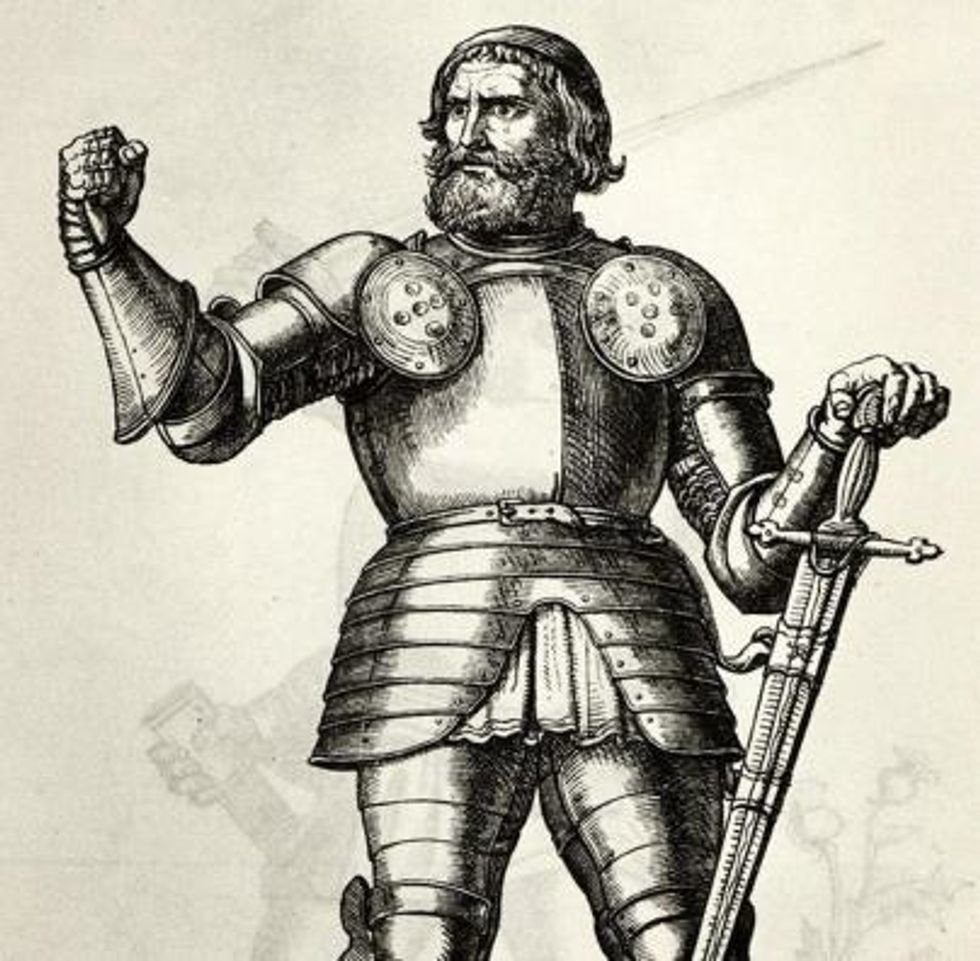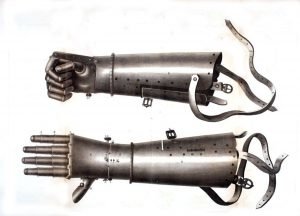Meet the Metal-Armed Medieval Warrior Whose Savage Insult Became a Classic

This article was originally published July 8, 2022, by We Are the Mighty.
By Blake Stilwell
Götz von Berlichingen was known for a lot of things. The most obvious was that he lost an arm to cannon fire in the heat of battle. Unfortunately for him, it was his right arm, the one that swung swords and dealt death. Unfortunately for all of his enemies, he wouldn’t die until age 82 – and he had a mechanical arm built just so he could keep killing them all.
That’s not even his most enduring legacy.
He was the first to tell an enemy to kiss his ass.
When your name is literally pronounced “Guts,” it becomes something of a self-fulfilling prophecy. It took him only three years to get sick of fighting for God and country for the Holy Roman Empire. So, the young von Berlichingen turned to fighting for something more tangible: money. He and his squad of Teutonic mercenaries fought for all levels of feudal lords and barons — anyone who could afford to have a soon-to-be legendary badass on their side.

It was in 1504, while fighting to take Landshut for the Duke of Bavaria, that a cannonball lopped his arm off at the elbow. He had two prosthetic arms created for himself – and one of them could still hold his sword or shield. So, von Berlichingen continued to make money the best way he knew how.
The knight seized merchant shipping, kidnapped nobles for ransom, and raided towns around Germany as a means of making money. This, unfortunately, earned him few powerful friends, and he found himself banned from the Holy Roman Empire on multiple occasions. He was even captured and held for ransom himself.
After his final ban, he joined the German peasants in exacting revenge on the leadership of the Holy Roman Empire. Despite that failure, he fought on until he was captured again. When finally liberated by Charles V, he was forced into a sort of house arrest, only allowed to come out in case Charles needed his services.

Berlichingen would assist German knights in fighting the Ottoman under Suleiman the Magnificent and invade France against the famous King Francois I. By then, however, he had already uttered his famous phrase. It was somewhere near Baden-Wurttemburg, while under siege, that the seemingly-immortal knight received a surrender demand. He was not impressed by it at all. He returned it with a famous response, telling the Swabian army (and their leaders) to kiss his ass.
After he was sick of mercilessly slaughtering Europeans all over the continent, Götz von Berlichingen decided to sit down and write his memoirs, which were apparently the greatest story ever told in German for the longest time. The German writer Johann Wolfgang von Goethe penned a 1773 drama that is still retold to this very day, based solely on the story of von Berlichingen’s account of his life.

We Are The Mighty is a veteran-led digital publisher and Emmy-award-winning media agency servicing brands with video production, marketing, advertising, and consulting services to engage with the military community. In addition to our digital publisher, we also run the Military Influencer Conference, the largest in-person event servicing our military community. WATM is owned by Recurrent Ventures and is a GSA approved vendor.
BRCC and Bad Moon Print Press team up for an exclusive, limited-edition T-shirt design!
BRCC partners with Team Room Design for an exclusive T-shirt release!
Thirty Seconds Out has partnered with BRCC for an exclusive shirt design invoking the God of Winter.
Lucas O'Hara of Grizzly Forge has teamed up with BRCC for a badass, exclusive Shirt Club T-shirt design featuring his most popular knife and tiomahawk.
Coffee or Die sits down with one of the graphic designers behind Black Rifle Coffee's signature look and vibe.
Biden will award the Medal of Honor to a Vietnam War Army helicopter pilot who risked his life to save a reconnaissance team from almost certain death.
Ever wonder how much Jack Mandaville would f*ck sh*t up if he went back in time? The American Revolution didn't even see him coming.
A nearly 200-year-old West Point time capsule that at first appeared to yield little more than dust contains hidden treasure, the US Military Academy said.












